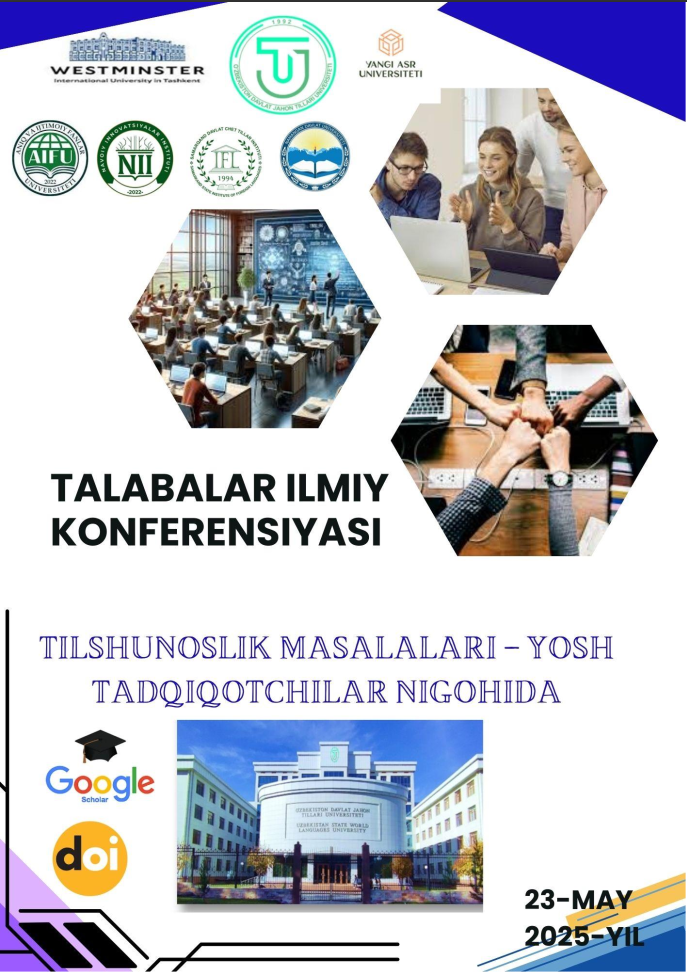THE PRINCIPLES OF TEACHING YOUNG LEARNERS
https://doi.org/10.5281/zenodo.15504975
Kalit so‘zlar
young learners, early childhood education, language development, learner-centered teaching, play-based learning, cognitive development, emotional engagement, holistic education, age-appropriate pedagogy, scaffolding, classroom interaction, motivation, child-centered learningAnnotasiya
Teaching young learners requires a distinctive approach grounded in an understanding of their cognitive, emotional, social, and linguistic development. Central to effective instruction is the ability to create a learning environment that nurtures curiosity, engagement, and confidence. Young learners thrive in contexts that are interactive, meaningful, and emotionally supportive, where learning is linked to play, exploration, and real-life experiences. Recognizing the unique needs of young learners is essential for fostering positive educational outcomes and lifelong learning habits.
Foydalanilgan adabiyotlar ro‘yhati
Berk, L. E. (2013). Child Development (9th ed.). Pearson Education.
Bodrova, E., & Leong, D. J. (2007). Developing Self-Regulation in Early Childhood: A Guide to Practitioners. Pearson.
Harris, P. L. (2008). Children’s Understanding of Emotion. Blackwell Publishing.
Hughes, C. (2010). Social Cognition and Social Development: A Vygotskian Perspective. Psychology Press
Khakimova S. D. Study And Classification Of Proverbs - Edupub https://journals.eduindex.org/index.php/ijss/article/download/6186/2761/
McLeod, S. A. (2018). Jean Piaget’s Theory of Cognitive Development. Simply Psychology.
Abduxayotovna A.X. (2021). Akademik litseylarning aniq yo’nalishida ta’lim olayotgan o’quvchilarning kommunikativ kompetensiyasini kommunikativ o’yinlar orqali rivojlantirish. Zamonaviy ta’lim. Современное образование, (109), 36-37.
Whitebread, D. (2012). The Importance of Play: A Report on the Value of Play in Early Childhood Education. Toy Industries of Europe.
Rashidova, G., & Komilova, R. (2024). THE IMPORTANCE OF PRONUNCIATION IN SECOND LANGUAGE LEARNING. Modern Scientific Research International Scientific Journal, 3(1), 53-58.
Kholbutayeva, S., & Gulshoda, R. (2025). PSYCHOLOGICAL FOUNDATIONS AND PEDAGOGICAL APPROACHES: EFFECTIVE WAYS TO FOSTER STUDENT DEVELOPMENT IN EDUCATION. TA’LIM, TARBIYA VA INNOVATSIYALAR JURNALI, 1(5), 43-47.
Abulkosimovna, E. Z. (2022). Synonymous analysis of professional words in English and Uzbek. Frontline Social Sciences and History Journal, 2(05), 15-22.
Sultonova, M. (2024, October). Features of Critical Thinking Skills for B1 Level Learners. In Conference Proceedings: Fostering Your Research Spirit (pp. 786-790).
Gulomova, R. (2023). EVOLUTIONARY HISTORY OF CURSING. Journal of Advanced Scientific Research (ISSN: 0976-9595), 3(12).
Kasimkhodjayeva, M. (2024). Scientific ethics and etiquette of uzbek students in writing. O ‘zbekiston davlat jahon tillari universiteti konferensiyalari, 613-619.
Erdanova, Z. (2019). Onomastic is a mirror culture. In Science and practice: a new level of integration in the modern world (pp. 149-152).
Sultonova, M., & Usmonaliyeva, M. (2024). Pragmalinguistics: exploring the social dynamics of language use. O ‘zbekiston davlat jahon tillari universiteti konferensiyalari, 633-638.
SULTONOVA, M. (2024). On the issue of critical thinking.
Sultonova, M. (2024, October). Features of Critical Thinking Skills for B1 Level Learners. In Conference Proceedings: Fostering Your Research Spirit (pp. 786-790).

